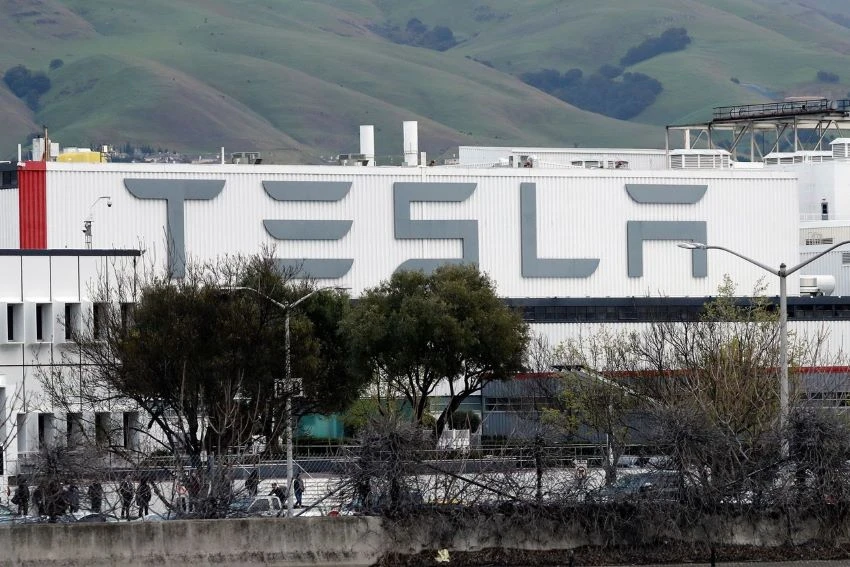
Facing pressure to shutter Tesla Inc.’s TSLA 18.39% California factory from local authorities worried about the spread of coronavirus, Chief Executive Elon Musk changed direction, announcing plans to suspend production at its lone U.S. auto-making plant.
The move threatens to disrupt the Silicon Valley auto maker just as it was stepping up production of its latest vehicle, the Model Y SUV, which is part of Mr. Musk’s plan to boost deliveries globally by more than 36% this year.
The health crisis from the spread of Covid-19—the illness caused by the coronavirus—in the U.S., especially in California, led counties in the San Francisco area on Monday to order nonessential businesses to close to allow people to stay home to combat the spread of the potentially deadly disease.
Tesla’s statement Thursday laid out a plan for work to be temporarily suspended at the Fremont factory. Production will cease at the end of March 23 to give the company time to “allow an orderly shutdown,” the company said, while it would conduct “basic operations” as required by authorities.
The auto maker will also stop production at its solar factory in New York while keeping its Nevada battery factory working along with its nationwide service and charging network.
That Tesla kept building cars Tuesday and Wednesday and showed no signs of stopping put it at odds with the rest of Silicon Valley. Even competitors General Motors Co., Ford Motor Co. and Fiat Chrysler Automobiles NV have all disclosed their own closure plans.
Even if Mr. Musk wanted to continue to make cars, analysts doubted he would be able to much longer as parts suppliers are likely to be affected by closures across the U.S. and Europe and previous ones in China. It is also likely that sales will fall dramatically in coming months. In China, which was first hit by Covid-19, new vehicle deliveries plunged almost 80% in February from a year ago.
Tesla also tried to reassure investors it could financially absorb the impact from the production pause, saying it had $6.3 billion in cash on hand at the end of December before raising an additional $2.3 billion in new shares a few weeks ago. Tesla also has access to about $3 billion in working capital plus financing available for its Shanghai factory, the company said.
“We have followed and are continuing to follow all legal directions and safety guidelines with respect to the operations of our facilities, and have honored the Federal Government’s direction to continue operating,” the company said in a statement. “Despite taking all known health precautions, continued operations in certain locations has caused challenges for our employees, their families and our suppliers.”
Tesla shares fell more than 7% in after-hours trading following the announcement. The stock had closed up 18% on Thursday, rebounding from one of its worst declines the day prior over shutdown concerns and a broader market rout.
The decision ends several days of confusion over the status of Tesla’s Fremont factory.
Initially, Alameda County, where the factory is located, said the plant wouldn’t need to close. Then, on Tuesday, the county sheriff’s office said Tesla wasn’t an essential business during the health crisis and would need to limit work to “minimum basic operations.” The office said it needed to stop production.
Despite the sheriff’s comments Tuesday, Tesla didn’t halt work at Fremont. Employees were instructed to continue working, though those who felt uncomfortable were told they could take personal time off to stay away.
Fremont Police Chief Kimberly Petersen earlier Thursday said she would meet with Tesla officials to discuss cooperation with a local government order directing nonessential businesses to shut down to combat the coronavirus pandemic. The police disclosed the meeting through a message on Twitter.
“The meeting went well and the city did not have to force a shut down,” Geneva Bosques, a spokeswoman for the police, said in an email. “Tesla came to the table fully prepared and explained how they would begin to decommission, in an effort to shut down their assembly line and factory operations. They will be allowed to maintain essential minimal business as outlined in the county order.”
Morgan Stanley estimates Tesla has enough cash to weather revenue falling 90% for several months. In such a case, the bank estimates, Tesla would burn about $800 million in cash a month.
Mr. Musk has publicly questioned reactions to the coronavirus pandemic, calling the risk of panic generated by the crisis worse than the health risks of the disease.
The auto maker hasn’t commented publicly about its efforts to keep workers safe. Earlier this year, Tesla closed its factory in Shanghai as part of the effort there to stop the spread of the virus.
On Twitter, Mr. Musk has responded to some of the criticism of his comments about the crisis. He said he would begin making ventilators if there is a shortage during the global pandemic.
He made the statement on Twitter late Wednesday in California, noting Tesla vehicles are built with sophisticated air-filter systems and that his other company, SpaceX, features such devices in the life-support systems on some of its spacecraft. Ventilators are seen as a crucial medical device to help treat the symptoms of Covid-19 by helping deliver oxygen to failing lungs.
“Ventilators are not difficult, but cannot be produced instantly,” he wrote in response to one Twitter user. “Which hospitals have these shortages you speak of right now?”
Early Thursday, New York City Mayor Bill de Blasio responded on Twitter, saying the city would reach out directly because it needed his help. “New York City is buying!” he wrote. “Our country is facing a drastic shortage and we need ventilators ASAP -- we need thousands in this city over the next few weeks.”




















